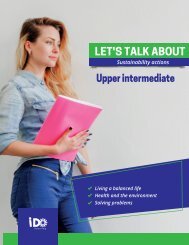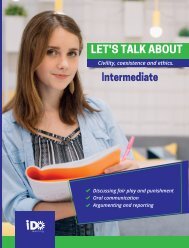Let's Talk About B1.1 (Lower Intermediate)
You also want an ePaper? Increase the reach of your titles
YUMPU automatically turns print PDFs into web optimized ePapers that Google loves.
Technology in our lives<br />
<strong>Lower</strong> intermediate<br />
Describing changes<br />
Technology<br />
Devices and events<br />
Dl e a r n i n g
“
. Respects physical, cultural,<br />
among others, of his<br />
classmates.<br />
.
Explains the reasons behind plans<br />
and actions related to his/her<br />
personal, school and community<br />
environment.<br />
in short written texts on academic topics<br />
In order to prevent Chikungunya, I w ill follow<br />
these recommendations: First, I w ill empty or cover<br />
containers such as buckets, dustbins and ower<br />
pots in my yard. By doing so, I can assure that<br />
mosquitoes don t breed in my house.<br />
Second, I w ill apply mosquito repellent on my<br />
arms and legs because the fragrance of the<br />
repellent w ill keep them aw ay.<br />
Third, I w ill sleep under a mosquito net when<br />
necessary so they don’t bite me at night.<br />
Chikungunya is preventable. It is always<br />
better to be cautious rather than getting<br />
this disease. Sometimes if it is not<br />
treated on time it may even lead to<br />
other health complications.<br />
ENDANGERED SPECIES<br />
EXTINCTION<br />
Survival<br />
Climate<br />
Human<br />
invervention<br />
Summarizes information s/he has<br />
read or listened to on academic and<br />
school related topics through a<br />
structured written text.<br />
Makes short presentations on<br />
academic topics of interest<br />
All people have the right to health<br />
as established in the Universal<br />
Declaration of Human Rights, but<br />
how the right is interpreted and<br />
applied depends on the conditions<br />
of every country.<br />
Good morning! Today, I am going to talk about Equality<br />
Right. According to the Charter Rules, “Every individual is<br />
equal; therefore, they should have the same right to the<br />
equal protection and equal bene t of the law w ithout<br />
discrimination and, in particular, w ithout discrimination<br />
based on race, national or ethnic origin, religion, sex, age<br />
or mental or physical disability”.
Expresses his/her opinion on an<br />
academic topic discussed in class<br />
Exchanges information about academic<br />
and general interest topics in a conversation.<br />
Blanca: Accepting differences helps us live in harmony.<br />
Paola: I agree w ith you. However, there are a lot of<br />
people in our country who don ́t accept differences.<br />
The Colombian Constitution states that “Colombia has<br />
ethnic, cultural, linguistic and religious diversity” but<br />
most of us don’t respect the characteristics of<br />
others.<br />
Blanca: A s Mr. Rodríguez said in class, we have to<br />
start in our homes and classrooms. W e need to set<br />
some rules among us to recognize the other.<br />
Paola: Actually, in our class we have agreed to not<br />
bully people who use<br />
piercings and tattoos. The<br />
reason for this bullying is<br />
that for some people<br />
piercings and tattoos are<br />
related to drug addiction.<br />
So, bullying is not allowed<br />
in our class.<br />
Blanca: Excellent idea! W e<br />
have to start w ith things<br />
like these actions.<br />
Susi: In this video, we can see that<br />
the number of pregnant teenagers<br />
has increased. The government has<br />
developed many campaigns but this<br />
situation continues.<br />
Lili: That´s right. Also, it was<br />
interesting to hear that teenagers<br />
don´t think about the consequences<br />
of their actions and don’t like to<br />
use contraceptive methods.<br />
Susi: I agree, we need to think<br />
more about the consequences<br />
of what we do.<br />
Identifies the type, purpose, and parts<br />
of a short written or oral text and shares<br />
ideas from the text with classmates.<br />
Produces medium length texts making<br />
recommendations or suggestions<br />
related to situations of academic,<br />
social, or personal interest.<br />
Text<br />
Purpose<br />
Type<br />
Parts<br />
“The text I read w as<br />
about netiquette. It had a<br />
short introduction where<br />
they de ne the w ord<br />
“netiquette” and then<br />
they present some rules<br />
to use when we post<br />
messages in the different<br />
media. At the end, the<br />
author says that<br />
follow ing netiquette<br />
rules is important to<br />
have effective<br />
communication.”
UNIT 1<br />
By the end of this lesson you<br />
will be able to:<br />
communicating in the past<br />
and the present.<br />
Recognize relationships of spatial<br />
and temporal contrast: family.<br />
Write simple narrations about the<br />
way food habits changed.<br />
Summarize my opinion in short<br />
oral texts.<br />
Discuss the most important<br />
technological inventions of the<br />
21st century in a conversation.<br />
Warming up<br />
let´s learn<br />
gadget appliance wireless<br />
1<br />
Gadget: A small piece of equipment<br />
that does a particular job.<br />
SPA: Artilugio.<br />
Appliance: A piece of electrical<br />
equipment with a particular<br />
purpose in the home.<br />
SPA: Electrodoméstico.<br />
Wireless: Using a system of radio<br />
signals rather than wires to<br />
connect computers, mobile<br />
phones, etc. to each other.<br />
SPA: Inalámbrico.
UNIT 1<br />
let´s discover<br />
We use used to when we refer to things in<br />
the past which are no longer true. It can<br />
refer to repeated actions or to a state or<br />
situation: He used to play football for the<br />
local team. Warning: In statements, the<br />
form used to does not change. We do not<br />
use the verb be before it.<br />
The negative of used to is most commonly<br />
didn’t use(d) to. Sometimes we write it<br />
with a final -d, but many people consider<br />
the form with the final -d to be incorrect.<br />
You should not use it in exams.<br />
Let’s Practice!<br />
Used to refers to actions and situations in<br />
the past which no longer happen or are no<br />
longer true. It always refers to the past. Be<br />
used to means ‘be accustomed to’ or ‘be<br />
familiar with’. It can refer to the past,<br />
present or future.<br />
Old televisions had a by resolution.<br />
Today's televisions have a minimum resolution of<br />
pixels.<br />
by<br />
<strong>Talk</strong> to your teacher and review how did you do in the practice area.<br />
Use this opportunity to ask for clarification and feedback.<br />
2
UNIT 1<br />
Let’s learn again!<br />
IT: The use of computers and<br />
other electronic equipment to<br />
keep and send information.<br />
SPA: Informática.<br />
Breakthrough: An important<br />
discovery or event that helps to<br />
improve a situation or provide<br />
an answer to a problem.<br />
SPA: Avance.<br />
IT<br />
breakthrough<br />
Let’s discover<br />
Comparatives<br />
Comparative adjectives compare one<br />
person or thing with another and enable<br />
us to say whether a person or thing has<br />
more or less of a particular quality:<br />
Josh is taller than his sister.<br />
Superlatives<br />
Superlative adjectives describe one<br />
person or thing as having more of a quality<br />
than all other people or things in a<br />
group: The ‘Silver Arrow’ will be the<br />
fastest train in the world when it is<br />
built.<br />
<strong>Talk</strong> to your teacher and review how have things gone so far. Prepare your conversation by using the box below.<br />
Things I understand well Things I could understand better<br />
Next steps<br />
3
UNIT 1<br />
Let’s Practice!<br />
Progress Check<br />
According to the audio, Kindle is:<br />
PE<br />
4
UNIT 1<br />
Vocabulary Consolidation<br />
Search engine: A computer<br />
program that finds information on<br />
the internet by looking for words<br />
that you have typed in.<br />
SPA: Buscador, motor de búsqueda.<br />
Hotspot: A public place where you<br />
can use a computer, mobile phone,<br />
etc. with wi-fi.<br />
SPA: Punto de acceso.<br />
Scope:<br />
covered by a book, programme,<br />
discussion, class, etc.<br />
SPA: Alcance, campo.<br />
Useful Expressions<br />
Bookmark: A way of marking a<br />
website so that you can find it<br />
easily.<br />
SPA: Marcador.<br />
Pixel: The smallest unit of an<br />
image on a television or computer<br />
screen.<br />
SPA: Pixel.<br />
Streaming: The activity of listening<br />
to or watching sound or video<br />
directly from the internet.<br />
SPA: Retransmisión.<br />
Storage: If things are in storage,<br />
they have been put in a safe place<br />
until they are needed.<br />
SPA: Almacenamiento.<br />
Hinder:<br />
something.<br />
SPA: Dificultar, entorpecer.<br />
Improvement: The process or<br />
result of something getting better.<br />
SPA: Mejora.<br />
log in/sing in<br />
They are in class<br />
hook up<br />
Raise your hand!<br />
to bookmark a webpage<br />
To connect to a computer using a<br />
username and password.<br />
To connect wires from<br />
machines to a power source or<br />
other machines.<br />
To mark a webpage for future<br />
purpose.<br />
to back up files<br />
a techie<br />
a computer buff<br />
computer problems.<br />
Somebody who has an interest<br />
in technology.<br />
An expert computer user.<br />
5




